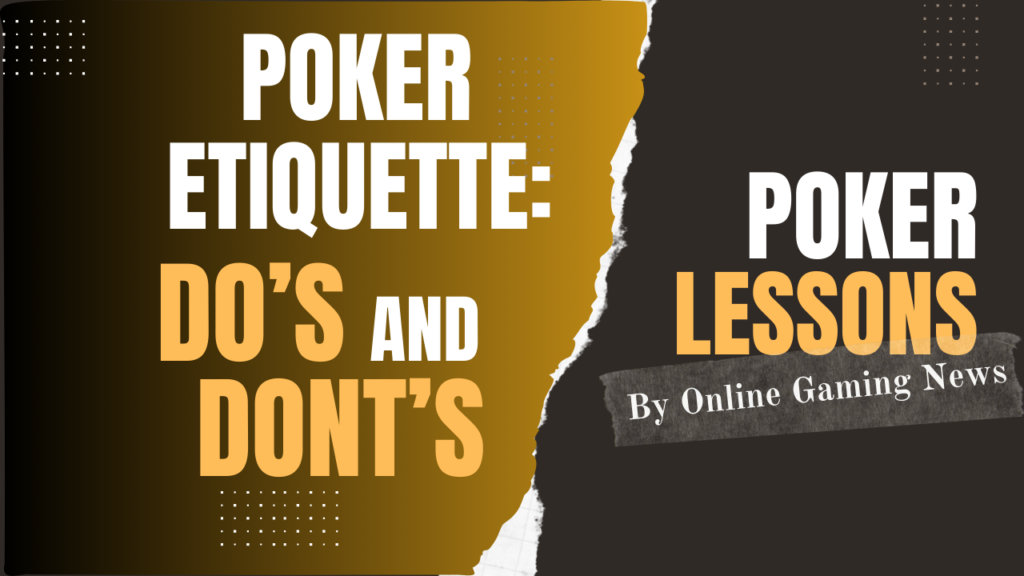
Poker etiquette refers to the unwritten rules that govern proper behavior at the table. While the game itself has specific rules, observing good etiquette ensures a pleasant experience for everyone. Whether you’re playing in a casino, at a home game, or online, practicing proper poker etiquette helps maintain fairness, prevents disputes, and ensures a positive playing environment.
Here are the do’s and don’ts of poker etiquette at the table:
Table of Contents
Do’s of Poker Etiquette
1. Act in Turn
Always wait for your turn to act. Acting out of turn is disruptive and can give away information about your hand unintentionally. It also creates confusion at the table. Pay attention to the order of play and only act when it’s your turn.
2. Protect Your Cards
Keep your cards hidden from other players to avoid giving away information about your hand. Use a chip or card protector to cover your cards so no one accidentally sees them. Additionally, if a dealer mucks your cards accidentally, it’s your responsibility to protect them.
3. Keep Your Chips Organized
Stack your chips in neat, visible piles so that other players and the dealer can easily see how much you have in front of you. This helps maintain transparency and prevents misunderstandings regarding chip counts.
4. Verbalize Your Actions
When making a bet, raise, call, or fold, announce your action clearly. Saying “call,” “raise,” or “all-in” reduces confusion and ensures there are no misunderstandings about your intentions.
5. Be Courteous to Dealers and Players
Treat the dealer and other players with respect. Dealers are doing their job, and berating or criticizing them is not acceptable. Likewise, respect other players, regardless of whether they are winning or losing. Politeness makes the game more enjoyable for everyone.
6. Follow the House Rules
Every casino or home game has its own specific rules, such as limits on mobile phone usage, time banks, and betting structures. Make sure you understand and follow the house rules to avoid conflicts.
7. Respect the Pace of the Game
Poker games have a rhythm, and it’s important to maintain that pace. Taking excessive time to act slows the game down and frustrates other players. Make decisions efficiently to keep the game moving.
8. Declare Your Hand at Showdown
If you go to showdown, clearly declare your hand so that everyone knows what you have. This eliminates confusion and makes it easier for the dealer to confirm the winning hand. If you’ve been called and aren’t sure whether you won, show your cards; don’t wait for your opponent to reveal theirs first.
Don’ts of Poker Etiquette
1. Don’t Slow Roll
Slow rolling is the act of delaying showing the winning hand at showdown, especially when you know you have the best hand. This is considered poor sportsmanship and can frustrate or anger your opponents. Always reveal your hand promptly at showdown.
2. Don’t Talk About a Hand in Progress
When you’re not involved in the hand, don’t discuss the action or speculate about the possible outcomes. Doing so can influence the decisions of active players. Stay quiet and let the hand play out without interference.
3. Don’t Show Your Cards to Other Players
Showing your cards to other players, whether intentionally or accidentally, gives them an unfair advantage and disrupts the game’s fairness. Keep your cards to yourself until the showdown or until you fold.
4. Don’t Angle Shoot
Angle shooting refers to using unethical tactics to gain an advantage at the table, such as pretending to fold when you actually plan to call or raising by an incorrect amount. While angle shooting isn’t always against the rules, it’s frowned upon and can lead to conflicts with other players.
5. Don’t Blame the Dealer for Bad Beats
It’s common to feel frustrated after a bad beat, but blaming the dealer is not appropriate. Dealers simply follow the rules and deal cards randomly. Stay composed, accept the outcome, and focus on the next hand.
6. Don’t Splash the Pot
When placing a bet, don’t throw your chips into the pot in a messy manner, known as “splashing the pot.” This makes it difficult for the dealer and players to track the amount bet. Place your chips neatly in front of you so the dealer can count them.
7. Don’t Berate or Criticize Other Players
Winning players may sometimes feel the urge to criticize or mock opponents for their perceived poor play. This is not only unsportsmanlike but also creates a hostile environment at the table. Keep comments respectful and friendly.
8. Don’t Abuse the Clock
Taking too much time to make decisions, also known as “clock abuse,” disrupts the game’s flow. If you are genuinely unsure about your decision, take the necessary time, but avoid stalling unnecessarily.
9. Don’t Be Distracted
Avoid being distracted by your phone, chatting too much, or doing other things while at the table. Distractions slow down the game and show a lack of respect for other players. Stay focused on the game to keep things moving smoothly.
Notes:
- Tipping the Dealer: In most casinos, tipping the dealer after winning a significant pot is customary. It’s a way to show appreciation for their work.
- Handling a String Bet: A string bet is when a player makes multiple motions to bet or raise without declaring their action beforehand. For example, placing chips in the pot, pausing, and then adding more chips without saying “raise” is a string bet. It’s against the rules and should be avoided by verbalizing your action.
- Don’t Discuss Your Hand: After folding, resist the urge to comment on what cards you had. Discussing your hand could give away valuable information to other players and influence the ongoing action.
Adhering to proper poker etiquette ensures a smooth, enjoyable, and fair game for everyone at the table. By observing these do’s and don’ts, you not only maintain the integrity of the game but also foster a positive atmosphere that encourages good sportsmanship. Whether you’re playing casually or in high-stakes games, respecting poker etiquette reflects well on you as a player and enhances the overall experience for everyone involved.






